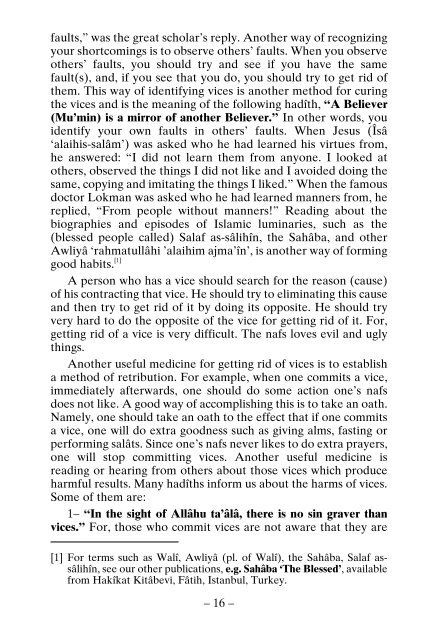Ethics of Islam
Ethics of Islam is taken from the book Berîka by Muhammad Hâdimi. Immorality and ways to get rid of it; 40 depravities and cures to them; usefulness of ethics; what is a soul; strengths of a soul; Personalities emanating from wisdom, courage, chastity and justice are extensively explained.
Ethics of Islam is taken from the book Berîka by Muhammad Hâdimi. Immorality and ways to get rid of it; 40 depravities and cures to them; usefulness of ethics; what is a soul; strengths of a soul; Personalities emanating from wisdom, courage, chastity and justice are extensively explained.
Create successful ePaper yourself
Turn your PDF publications into a flip-book with our unique Google optimized e-Paper software.
faults,” was the great scholar’s reply. Another way <strong>of</strong> recognizing<br />
your shortcomings is to observe others’ faults. When you observe<br />
others’ faults, you should try and see if you have the same<br />
fault(s), and, if you see that you do, you should try to get rid <strong>of</strong><br />
them. This way <strong>of</strong> identifying vices is another method for curing<br />
the vices and is the meaning <strong>of</strong> the following hadîth, “A Believer<br />
(Mu’min) is a mirror <strong>of</strong> another Believer.” In other words, you<br />
identify your own faults in others’ faults. When Jesus (Îsâ<br />
‘alaihis-salâm’) was asked who he had learned his virtues from,<br />
he answered: “I did not learn them from anyone. I looked at<br />
others, observed the things I did not like and I avoided doing the<br />
same, copying and imitating the things I liked.” When the famous<br />
doctor Lokman was asked who he had learned manners from, he<br />
replied, “From people without manners!” Reading about the<br />
biographies and episodes <strong>of</strong> <strong>Islam</strong>ic luminaries, such as the<br />
(blessed people called) Salaf as-sâlihîn, the Sahâba, and other<br />
Awliyâ ‘rahmatullâhi ’alaihim ajma’în’, is another way <strong>of</strong> forming<br />
good habits. [1]<br />
A person who has a vice should search for the reason (cause)<br />
<strong>of</strong> his contracting that vice. He should try to eliminating this cause<br />
and then try to get rid <strong>of</strong> it by doing its opposite. He should try<br />
very hard to do the opposite <strong>of</strong> the vice for getting rid <strong>of</strong> it. For,<br />
getting rid <strong>of</strong> a vice is very difficult. The nafs loves evil and ugly<br />
things.<br />
Another useful medicine for getting rid <strong>of</strong> vices is to establish<br />
a method <strong>of</strong> retribution. For example, when one commits a vice,<br />
immediately afterwards, one should do some action one’s nafs<br />
does not like. A good way <strong>of</strong> accomplishing this is to take an oath.<br />
Namely, one should take an oath to the effect that if one commits<br />
a vice, one will do extra goodness such as giving alms, fasting or<br />
performing salâts. Since one’s nafs never likes to do extra prayers,<br />
one will stop committing vices. Another useful medicine is<br />
reading or hearing from others about those vices which produce<br />
harmful results. Many hadîths inform us about the harms <strong>of</strong> vices.<br />
Some <strong>of</strong> them are:<br />
1– “In the sight <strong>of</strong> Allâhu ta’âlâ, there is no sin graver than<br />
vices.” For, those who commit vices are not aware that they are<br />
[1] For terms such as Walî, Awliyâ (pl. <strong>of</strong> Walî), the Sahâba, Salaf assâlihîn,<br />
see our other publications, e.g. Sahâba ‘The Blessed’, available<br />
from Hakîkat Kitâbevi, Fâtih, Istanbul, Turkey.<br />
– 16 –

















